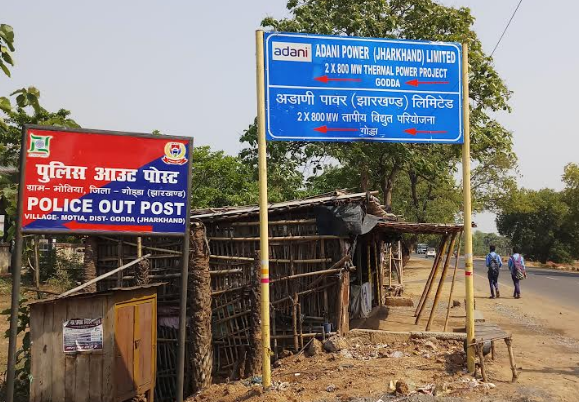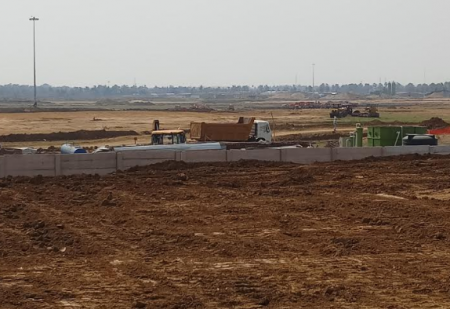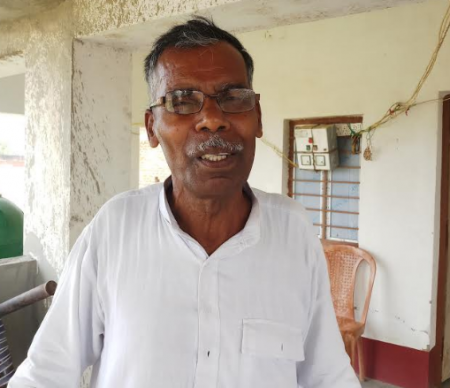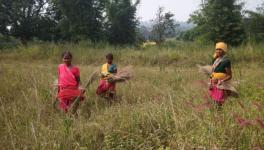Elections 2019: Politicians Overlook Land Acquisition for Adani Power Plant in Godda

Godda (Jharkhand): As the campaigning for the last three seats (Godda, Dumka and Rajmahal) of Jharkhand that are going to polls on May 19 in the final and seventh phase of the 2019 Lok Sabha elections ended on May 17 at 4 PM, political parties desisted from raising the case of the Adani power plant. The plant was once a major issue due to the forced land acquisition by the government for the 1,600 megawatt power project which is scheduled to be operational from 2022.
Even Pradeep Yadav of the Jharkhand Vikas Morcha (JVM) - a political outfit formed by former Chief Minister Babulal Marandi - who was jailed for around five months for spearheading a campaign against the Rs 15,000 crore project, did not make the alleged land grab, displacement and crackdown against the protesters, his poll plank.
The thermal power plant is coming up around 10 km from Godda town on the Gumla-Bhagalpur highway. A left turn from the highway leads to Motia village, from where one has to drive 5 km down to reach the actual site, which has concrete boundary walls - with barbed fences - on a huge area of land covering around 11 villages.

Motia witnessed a series of massive protests in 2017, when Adani Power signed a memorandum of understanding (MoU) with Bangladesh to set up a 800 MW thermal power plant here. As the government identified 2,300-odd acres of land for the project and notified 11 villages, protests spread in Motia and several other villages such as Ganga, Gayghat, Mali and Nayabad.
Also Read: Opposition Questions Jharkhand Nod for 16 Acres for Adani Power Ahead of Polls
As the resistance turned violent because of the alleged instigation by the police and authorities, JVM General Secretary and Poreyahat MLA Yadav was slapped with a number of criminal cases - including inciting violence following a public meeting on the environmental assessment of the proposed power plant - for leading protests against the land acquisition. He was lodged in jail on April 22 and granted bail on September 21, 2017 by the Jharkhand High Court.
He is contesting the Lok Sabha elections from Godda against BJP's sitting MP Nishikant Dubey - who is known for mobilising huge funds for his party. Yadav was so keen to contest the election from here that he had announced that he would go solo if denied a ticket from the Opposition alliance (Congress-Jharkhand Mukti Morcha-Jharkhand Vikas Morcha-Rashtriya Janata Dal).
Political activists are of the view that no leader wants to be perceived as "anti-corporate" or "anti-development" any more, and that might be the reason that Yadav gave a wide berth to the issue of the power plant during his campaign.
One of the activists said, "The reason behind the agitation losing momentum was that a section of those who lost lands were Brahmins and Patels, who are not dependent on their land holdings. They have other sources of income and are settled outside the state. Majority of them were not even beneficiaries of their land, which used to be cultivated by local poor farmers (Yadavs and tribals) on produce sharing arrangements. They were the people who willingly offered their land first when their villages were notified for land acquisition. They got good compensation of Rs 49 lakh/acre from Adani Powers. With their help, the company successfully sent out a message that the project is a harbinger of change for the local people.”
“The tribals are the real sufferers because they have no other source of livelihood, but who cares about them. Standing for their rights is propagated as anti-development and anti-corporates," he told NewsClick claiming that had it been the cultivated land of influential communities, with their livelihood depending on it, the government would have been forced to drop the project.
Also Read: Jharkhand Activists Urge Governor to Immediately Stop Adani Power Plant
Violation of Procedures
As per the Land Acquisition Act, 2013, social impact assessment is the first step of acquiring land for any government and private project.
A table survey was allegedly done by Adani Powers - which took "some locals into confidence and prepared a fabricated report". Explaining the reasons behind this allegation, Chinta Mani Sahu - who has lost his land and challenged the acquisition process in the Jharkhand High Court - said, "The survey was done by AFC - a nodal agency of Adani Powers. The company showed in its report that Adivasis (who mainly belong to Santhal tribes in this region) were living in the villages where not a single tribal lives, while non-Adivasis were shown as living in areas which are entirely inhabited by tribals. The report also says all the 11 notified villages don't have a single individual who has pursued technical education (diploma engineering/B.Tech/M.Tech). This is contrary to the fact that there are dozens of youth with technical education in Motia alone."

Chinta Mani Sahu
"Jab buniyad hi jhoot pe tiki hai to upar ki sari cheezen ghalat hongi (When the foundation is based on lies, everything that follows will be wrong)", he said. As per the rule, the next step - which is 'Jan Sunwai' (public hearing) - was held on December 6, 2016, based on the "bogus" assessment report.
"It was held at Motia in Godda block and Baksara in Poriyahat block. As per the advertisement published in newspapers, it was scheduled to begin from 11 AM at both locations. People with their land documents and valid identity cards reached the venue before the announced time. To their surprise, they found unknown faces, who hired daily wage labourers, taking part in the 'Jan Sunwai' - which had started from 6 AM. The affected villagers were not allowed to enter the venue as they did not have the green or yellow cards (which read 'Bhuarjan ki Jan Sunwai' (public hearing for land acquisition) issued by the company. The cards were supplied to the fake land owners in advance," he alleged.
When people protested, they were lathi-charged. A strong police force of around 500 cops even allegedly entered nearby houses and thrashed whosoever they found. The men in uniform along with company officials also allegedly threatened people against filing complaints. If they dare to do it, the protesters alleged, they would meet the same fate again.
"Even I was placed under house arrest, with several police vehicle surrounding my house. At around 11.45 am, it was announced that people have agreed to give their lands to Adani Powers," said Sahu.
Ironically, no newspaper carried even a small story with regard to the police assault.
The second public hearing was organised on March 5, 2017 at Motia high school campus. People living in the 10 km radius of the proposed project site were invited to attend the meeting. The same incident was allegedly repeated this time again. Instead of the cards, the "outsiders" were given a white colour 'gamcha' (traditional thin, cotton towel) for identification. The police were allegedly directed to allow entry to only those who had the special 'gamcha'.
The genuine land holders once again protested and baton-charged. Soon, Pradeep Yadav reached the spot and ensured that people with valid identity cards and land documents can enter the venue and register their protest. But only those who were allowed in the earlier hearing were again heard in this 'Jan Sunwai'.
Notably, this hearing was organised to discuss the environmental impact of the proposed power plant. But in their video recorded consent, they can be seen as saying, "Plant lagna chahiye...hamein achcha muafza aur bachchon ko naukri milni chahiye (The plant should be set up...We should get good amount of compensation and our children should get jobs)."
This kind of irrelevant consent - said Sahu - raises doubt on the credibility of the hearing. This meeting was called to discuss the impact of the proposed project on environment, water bodies, fishermen, cattle rearers and farmers.
According to the CEA (Central Electricity Authority) - on whose report a DPR (detailed project report) is prepared, 18,000-20,000 tonne of coal will be consumed in a power plant with a proposed production capacity of 16,000 MW. It further says that 9,000 litres of water is consumed to produce 1 MW of electricity. For 1,600 MW, the water consumption will go up to 15 crore litres everyday. The plant will emit 6,600 tonnes of ashes per day; it will emit 11,000 tonnes of toxic gases such as sulphur dioxide, carbon dioxide and carbon monoxide everyday. The report also lists that 32,000 tonnes of oxygen will be consumed everyday in the burning of coals.
Also Read: Jharkhand: ‘Forceful’ Land Acquisition, ‘Govt Brutalities’ Define Adani Power Project in Godda
"Ideally, these crucial facts and its impact on environment and people's life should have been discussed in the meeting. The participants were supposed to ask the company official about the management plan and remedy of the upcoming hazards," said Sahu - who retired as a science teacher.
The Protests
It was earlier claimed that the Adani Power plant would be a public purpose unit. But the claim was not entirely true as the power produced would be sent to Bangladesh as mentioned in the MoU signed between Adani Power, the Government of Jharkhand, the Government of India and the Bangladesh government.
Prime Minister Narendra Modi says that the country needs energy-based development.
Angry with the condition of exporting electricity, which has been produced in Jharkhand at the cost lives and livelihood of thousands of people, to Bangladesh, people had staged protests in the beginning. To douse their anger, the state government made an statement that Adani Powers has committed to give 25% (400 MW) of the installed capacity to the state through alternative source of energy.
However, Sahu alleged, “It was a lie. There is no mention of alternative source of energy in the MoU. Adani had already clarified that it won't supply electricity to the Jharkhand government."
Those who are opposing the project tooth and nail said they have three objections on the proposed power plant.
First, the government is using Sub-section II of the Section 2 of the Land Acquisition Act, 2013, which defines the term "public purpose" – any unit or project that has direct government investment, directly controlled by the government and whose policies are made by the government. The government of late, has listed the power plant, which is involved in production, distribution and transmission, as public sector infrastructure. Using this definition, the advocate general of the state government has argued in the High Court - where the entire process of the acquisition has been challenged - that the proposed power plant is a "public purpose" unit.
"Going by the advocate general's argument, both the NTPC (National Thermal Power Corporation) and Adani power are public sector units. And if not, the latter is not a public purpose unit," argued Sahu. The matter is pending in the High Court, where not a single argument has taken place in the past one year.
Second, Section 20 of the Santhal Pargana Tenancy (SPT) Act says no sale, lease or transfer of land can take place in tribal areas. It can only be acquired for a project of public purpose.
Third, according to the Land Acquisition Act, 2013, which talks about food security, no industrial project can come up on agricultural land that produces many crops. The company's EIP (environmental integrity project) report showed that 70.3% of the total land needed for the power plant is irrigated and multi-cropped.
Also Read: Jharkhand Govt’s Land Acquisition for Adani Power Plant Challenged in Court
"We claim over 80% of the land is cultivated and we have also submitted a CD showing the land with crops in the court," said Sahu - who is a bit disappointed with the issue fading gradually, the snail’s pace of progress of the case.
The Social Impact Assessment report of the proposed power plant says livelihood of 87.5% of people here depend on agriculture. "The above facts prove our point that the land is multi-crop agricultural land, which cannot be acquired. And a power plant can not come up here," he argued.
Section 8 of the Land Acquisition Act says the government must decide beforehand whether any proposed project is in public interest in true sense. The same section also says if there is any unused acquired land, it should be used instead of going for a new acquisition. In 2011-12, around 1,200 acres of land was acquired at Suder Pahadi block in the district for a proposed Jindal Steel Plant. The plant did not come up and the acquired land is still unused. This area could have been used instead of the new acquisition.
The consent (needed under Section 19) of several land holders for acquiring their land was allegedly obtained forcibly. "Many of us were threatened to sign the consent paper. Thumb impressions, land documents and Aadhar cards of those who cowed down were taken. They were made to sign dues papers and compensation amounts were transferred to their bank accounts," said Major Hembrum - whose video had gone viral on the social media, wherein he can be seen being threatened of getting killed by the company and administrative officials if he does not give his land. Hembrum is among 400 people who have not signed any document and lodged their protest to the governor through an affidavit.
"The land of 80% people have been acquired by threatening them. They were told if MLA Pradeep Yadav can be jailed and activist like Chinta Mani Sahu can be booked, they will not stand any chance," Sahu alleged.
Around 5.25 hundred acres of land have been acquired so far and given to Adani. Community land such as Gauchar (grazing land), graveyard, crematorium - over which the the respective Gram Sabha (primary body of the Panchayati Raj system) has control - has also been transferred to the company. Importantly, only those who have lost their land have been compensated. However, Section 3 of the Land Acquisition Act says apart from land owners, those depend on it such as 'bataidaar' (those who take others land on lease for cultivation), cattle rearers, fishermen, etc. will also be considered as affected people and compensated.
Also Read: Fact-finding Report Flags ‘Forceful Land Acquisition’ by Adanis in Jharkhand
Surya Narayan Hembram, a resident of Mali village, has also not given consent for acquisition of his 13.7 katha of land. In July last year, he had sown paddy seeds but company representatives along with the police dug up his fields.
"Jab SP, Dy.SP, DC, Raghubar Das aur Modi sab company ka, to kaun sunega hamari baatein (When everyone from the Superintendent of Police, Deputy SP, District Commissioner, CM Raghubar Das and PM Modi are working to protect the company's interest, who will listen to us)?" he asked, expressing the hopelessness and despair of the affected people.
Get the latest reports & analysis with people's perspective on Protests, movements & deep analytical videos, discussions of the current affairs in your Telegram app. Subscribe to NewsClick's Telegram channel & get Real-Time updates on stories, as they get published on our website.























